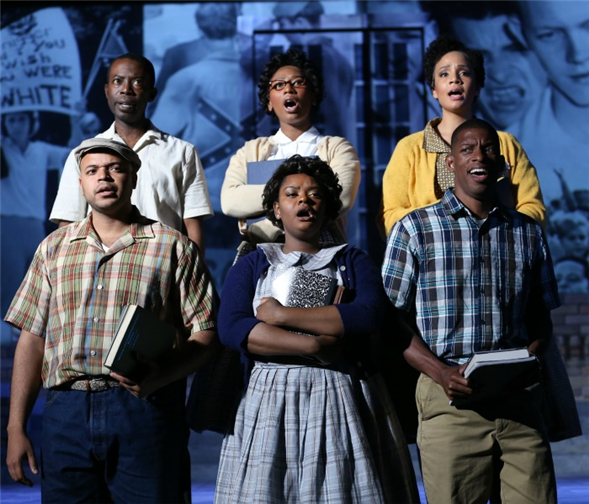Translate Page

Writer-director Rajendra Ramoon Maharaj dramatizes a critical moment in our nation's history
---
It's long been said that history is written by the winners. But when those victors are people of color, they often don't get to tell the heroic parts of their past. That may be why playwright Rajendra Ramoon Maharaj never heard about the Little Rock Nine in school. "Black History was February and it was more about slavery and then straight away to Dr. King had a dream," he recalls. When Maharaj finally learned about the courageous African-American students who forced Arkansas' Little Rock Central High School to integrate in 1957, he knew he wanted to write a play about them. "It was a pivotal moment that affected every aspect of our society," says Maharaj, who identifies as Indo-Afro-Caribbean American. "These kids just wanted to go to school and had so much racism and ignorance come their way."
After a decade's worth of research, including interviews with people who were there, Maharaj's Little Rock premiered at Trenton, NJ's Passage Theatre in 2014. It's now making its Off-Broadway debut at the Sheen Center. Written and directed by Maharaj, the play explores the real-life struggles of Carlotta Walls LaNier, Melba Pattillo Beals, Terrence Roberts, Gloria Ray Karlmark, Thelma Jean Mothershed-Wair, Ernest Green, Elizabeth Ann Eckford, Minnijean Brown Trickey and Jefferson A. Thomas, who suffered abuse from local law enforcement, fellow students and even the governor of Arkansas while trying to get an education. When they were barred from entering the all-white high school, President Dwight D. Eisenhower had to send federal troops to escort them in.
Fast-paced and fact-filled, Little Rock views those tumultuous times through the eyes of the children at the heart of the crisis. "They were being called the N-word and the governor was asking people to take to the streets against them," says Maharaj. "They were not civil rights activists. They were not Dr. King or Malcolm X. They were kids."
The play presents the Little Rock Nine not as a homogeneous group, but as individual adolescents who manage the stress in different ways. Thomas, for example, tells corny jokes. "He used humor to deal with the pain he was going through emotionally and physically," Maharaj says.
{Image1}
Maharaj frequently uses the docudrama genre to examine the lives of everyday African Americans who were suddenly (and usually unwittingly) thrust into the center of our country's ongoing racial strife. His prior works include The Ballad of Trayvon Martin, about the unarmed African-American teen who was murdered by a neighborhood watchman in 2012, and Mother Emanuel, a Gospel song-infused celebration of the victims of the Charleston church massacre in 2015. Little Rock gives him a chance to tell a true story with a happy ending that he hopes will inspire young audiences of color to "leave the theatre walking a little bit taller, knowing they come from that stock," he says. "If you look at the world right now, there are people trying to revise history and turn back time, so this story is a reminder of the power that children have."
He also wants theatregoers to recognize that, while it may seem like ancient history, the Little Rock Crisis occurred a mere 61 years ago. "Many of us have grandparents their age," he notes. Sadly, discrimination continues to run rampant today. There's currently a racially charged debate raging about how to address the severe segregation in New York City public schools, and on a national level, data shows hate crimes are on the rise. "Parents are trying to keep their children in less diverse schools because they think kids of color bring down their grades, and men of color are being victimized by police, being pulled over for no reason," says Maharaj. "People are using the word 'crisis' again. We used that word in 1957 for Little Rock. We need to do better."
To read about a student's experience at Little Rock, check out this post on TDF's sister site SEEN.
---
TDF MEMBERS: At press time, discount tickets were available for Little Rock. Go here to browse our current offers.
Jose Solís is a NY-based writer and editor who's been covering theatre and film professionally since 2003. He is a member of the Drama Desk. Follow him at @josesolismayen. Follow TDF at @TDFNYC.
Top image: Charlie Hudson III, Anita Welch, Stephanie Umoh, Damian Jermaine Thompson, Shanice Williams and Justin Cunningham in Little Rock. Photos by Carol Rosegg.